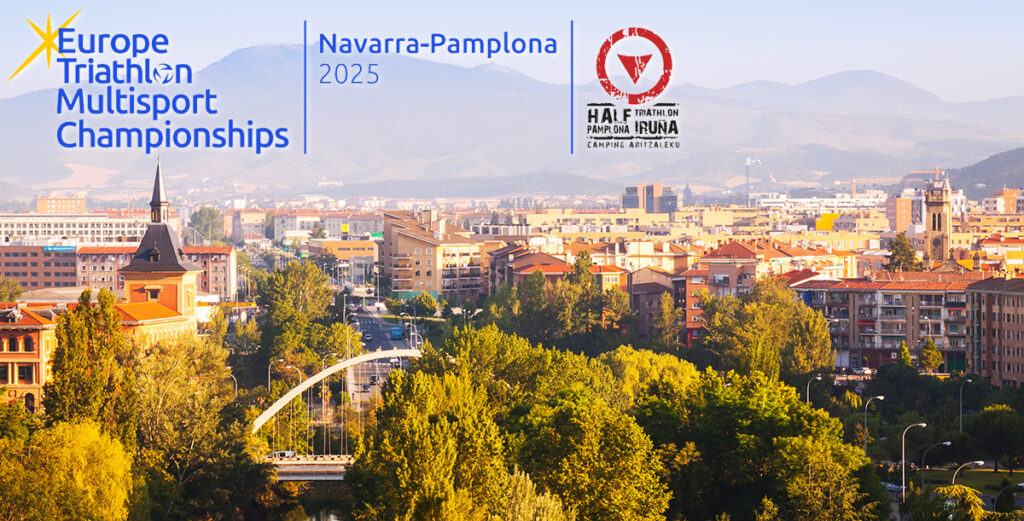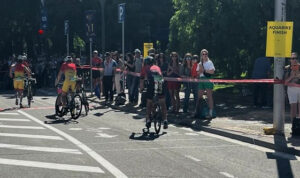Last weekend Spain’s half-distance classic from Lerate’s Alloz Reservoir into the heart of Pamplona hosted the European Aquabike Championships. A 1.9 km swim in crystal-clear lake water was followed by a challenging 85 km point-to-point bike course.

The first challenge of the day came before the start though. Standing in the Spanish midday sun in a wetsuit for 45 minutes to wait for the start was not to everybody’s liking. Despite the long wait, the almost 1.000 athletes of the European Triathlon and Aquabike Championships and the open races all started within 20 minutes. What necessarily followed was “carnage” as on athlete described it. However, the fact that the buoys were quite far apart probably helped to make the swim less congested, by making orientation a bit difficult at some points. The traffic however was even more of an issue in the bike leg. Because only the first few kilometres of the course were closed for car traffic. And with so many athletes starting in such a short period of time, blocking was once again an issue for the strong cyclists. “I was in the last wave to start the swim. When I arrived at T2 there were only a few bikes. So, I passed probably about 800 athletes on the bike course. That really wasn’t much fun.” said Frank Erk, who set the fastest bike split that day.
Why this matters
Sometimes I feel like I shouldn’t annoy you over and over again with the repeated moaning about too much traffic on the bike course. After all it’s the athletes who create dangerous situations. However, if ambitious athletes who have spent weeks, months, or even years training toward a goal are placed in situations where they must take risks to finally achieve it, it is hardly surprising when dangerous situations arise. It is as much in the responsibility of athletes to avoid dangerous situations as it is the race organizers responsibility to make them as avoidable as possible. And this did certainly not happen in the most recent international championship races, especially in Spain. The reason why I’m pointing this out here is because it was just now that I heard that one of the athletes who crashed in Torremolinos was fighting for her life for quite a while after the accident. Addressing the issue of over crowded bike courses is about more than just keeping the strong cyclists from being blocked all the time.
The more pleasant takeaways
 But let’s come back to Pamplona, where certainly not all of the organizational part of the race was only bad. In fact, many athletes spoke about an overall very well-organized race in their comments and reviews. And at least we finally had an international championship event in Spain where the finish line was not an issue. Although this was probably more due to geographical circumstances than due to great race organization. The 2025 World Triathlon Competition Rules require the aquabike finish line to be 100 to 200 metres before the dismount line. In the picture you can see what looks like a Spanish version of 100 metres. Though this wasn’t an issue at this particular race. Despite the last 500 metres before the dismount line being flat (other than I stated at the race preview) the uphill section before that was enough to avoid high speed sprint finishes. What was widely criticised and poorly rated by aquabike athletes though was the finish line experience which was – well – none. After getting into T2 they just had to rack their bikes and leave to get some post-race meal. No crossing the finish line to get a nice picture and your finisher medal. No kind of announcement or celebration left many aquabike athletes quite disappointed.
But let’s come back to Pamplona, where certainly not all of the organizational part of the race was only bad. In fact, many athletes spoke about an overall very well-organized race in their comments and reviews. And at least we finally had an international championship event in Spain where the finish line was not an issue. Although this was probably more due to geographical circumstances than due to great race organization. The 2025 World Triathlon Competition Rules require the aquabike finish line to be 100 to 200 metres before the dismount line. In the picture you can see what looks like a Spanish version of 100 metres. Though this wasn’t an issue at this particular race. Despite the last 500 metres before the dismount line being flat (other than I stated at the race preview) the uphill section before that was enough to avoid high speed sprint finishes. What was widely criticised and poorly rated by aquabike athletes though was the finish line experience which was – well – none. After getting into T2 they just had to rack their bikes and leave to get some post-race meal. No crossing the finish line to get a nice picture and your finisher medal. No kind of announcement or celebration left many aquabike athletes quite disappointed.
The Men’s Race
There was little doubt about who would be the first aquabiker to exit the water. And former Olympic swimmer Filip ZABOROWSKI certainly did not disappoint. In a time of 22 minutes and 38 seconds he was about half a minute faster than the strongest pro triathletes – despite having to fight his way through hundreds of age group triathletes. A bit of a surprise though was the relatively small time gap to his next competitors. Only a minute later young Frenchman Bastien RAVENELLE came into T1, closely followed by Ivan RUBIO RUBIRA, with Marcos DEL ÁLAMO MARTÍNEZ only one more minute down – all of them competing in their very first aquabike race. Next of the prerace favourites out of the water was Cesar PEREIRA DEL PINO. In 6th position he was already down almost 6 minutes. Fabián BADÍA VICENT and Kris WHITELAW followed about a minute later. The strong cyclists Frank ERK and Jean Marie LE BORGNE finished the swim together, 8:55 behind the leader. Two minutes later two other strong Frenchman followed. Paul VANOTTI was closely followed by 2023 European and World Champion Mathieu DUMONT who already passed his fellow countrymen through transition and started to hammer his way through the bunch of triathletes and aquabike athletes on the road.
From the fast swimmers it was Ivan RUBIO RUBIRA who was the first one to drop back, losing position by position to the strong cyclists to finish the race just outside the top 10. After 60km on the bike, the other three strong swimmers were still leading the race, though it was not standard distance World Champion Filip ZABOROWSKI on the front. Bastien RAVENELLE showed an impressive performance on the bike as well. At that point of the race he had a two minute time gap to Marcos DEL ÁLAMO MARTÍNEZ, with the Pole another minute behind. But on the bike Mathieu DUMONT once again seemed unstoppable. He closed the gap to Frank ERK and the duo was chasing down the swimmers, only 40 more seconds down.
Bastien RAVENELLE was too strong that day to be caught by the uberbikers. He crossed the finishline with an overall time of 2 hours, 38 minutes and 24 seconds, to take a clear victory in his very first aquabike race. Chapeau!
While Bastien could already celebrate his victory, some drama about the remaining spots on the podium unfolded. 4 km before the finish, the German-French duo had passed the strong swimmers from Spain and Poland, when last year’s runner up Mathieu DUMONT lost probably about a minute and half due to a mechanical problem. So it was Frank ERK who came in second, two and a half minutes down on the winner, taking the third consecutive overall podium at European Championships with a quite impressive performance on the bike. So the fight for the podium seemed to be up between the two swimmers. But Filip ZABOROWSKI had to serve a two minute penalty, so it was Marcos DEL ÁLAMO MARTÍNEZ to take the remaining spot on the podium, almost two minutes behind the German. Mathieu DUMONT took fourth place, missing the podium due to his mechanical by just 25 seconds. After his stop in the penalty box Filip ZABOROWSKI managed to stay in fifth place, just ten seconds ahead of Jean Marie LE BORGNE. With Paul VANOTTI coming in half a minute later, the Grand Nation took no less than four out of the top 7 spots of the race. Chapeau!
Cesar PEREIRA DEL PINO followed in 8th place a minute later. The newly crowned British Champion Kris WHITELAW followed half a minute later, beating his age group rival Fabián BADÍA VICENT by just six seconds.
The Women’s Race
Not only the men’s field had some super strong swimmers on the start line. In the women’s race it was Ariadna ARISÓ VILANOVA who came out of the water first in her very first aquabike race. With a time of 27 minutes and 41 seconds, she was right up there with the fastest female pro triathletes of the day, despite having to zigzag her way through the slower age group triathletes. Only about half a minute later Hayley DAVIS was the next to follow her, with another Spanish first time aquabike athlete Beatriz ARRUZA ROBETA coming into T1 another minute behind. One of the prerace favourites Kai SACHTLEBER followed in 5th place 4 minutes behind the leader, with other strong British athletes Claire MARTIN and Toni SENIOR following within 80 seconds. Elke SCHÖNHARDT followed with a time gap of 7 minutes to the Spanish leader, while defending champion Victoria ROTHWELL needed another minute before she finished her swim.
The leading girl from Spain quickly showed that she’s not only a strong swimmer. She was also the fastest female athlete through transition and showed that she will be hard to catch on the bike that day. After the other strong swimmers could not follow her pace, she had a clear lead of more than five minutes after 60 km on the bike. It was a British trio separated by only 50 seconds to follow her. Claire MARTIN and Toni SENIOR were in 2nd and 3rd while prerace favourite Victoria ROTHWELL quickly closing the gap to the podium spots. She was able to pass her fellow countrywomen on the way to the finish. The leading Spaniard however was too far in front to catch. Ariadna ARISÓ VILANOVA came home with a clear win on home soil in a time of 03:03:00. Victoria ROTHWELL came in 3:50 minutes later, while Claire MARTIN won a close fight for the remaining spot on the podium, putting Toni SENIOR into fourth place. With Hayley DAVIS it was another British athlete to follow in 5th place, before Germany’s Elke SCHÖNHARDT crossed the finish line 12 minutes down on the winner. Ellie GARRETT came in 7th just ahead of Irune LÓPEZ CARRIBA who made her way up to 8th place with a strong performance on the bike. Kai SACHTLEBER followed in 9th place, while strong young swimmer Beatriz ARRUZA ROBETA managed to hang on to the top 10 by a few seconds.
| Rank | Country |  |  |  |
| 1. | United Kingdom | 8 | 5 | 5 |
| 2. | Spain | 7 | 6 | 8 |
| 3. | France | 3 | 4 | 2 |
| 4. | Germany | 3 | 4 | 0 |
| 5. | Austria | 2 | 1 | 0 |
| 6. | Poland | 1 | 0 | 1 |
| 7. | Denmark | 0 | 1 | 0 |
| 8. | Belgium | 0 | 1 | 0 |
| 9. | Ireland | 0 | 0 | 2 |
| 10. | Malta | 0 | 0 | 1 |
Despite missing the overall win, the medal table shows the dominance of British aquabikers in the female category. Six out of eleven age group titles and 13 out of 30 medals were taken by GB athletes. And there’s one silver medallist who is worth to be mentioned. Joanna Lewis missed the title in her first year in the F70 category, but brought home her sixth medal in European Aquabike Championships, making her the athlete with the most medals won in the now seven European Championships.
In the men’s race the home country was clearly the most successful. With five gold, two silver and six bronze medals, the Spaniards clearly dominate the medal statistics. With three titles and nine medals altogether the Frenchman were stronger than ever in aquabike championships, forcing the Brits to settle for third place in the men’s medal table.
From the ten countries who had podium finishers at the aquabike race in Pamplona it’s only France, Germany and Malta who still don’t have national championships. While there are no aquabike races yet in Malta, it’s about time for France and Germany to give their quite successful aquabike athletes also the chance to shine at national championships.
